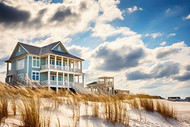Why Aluminum Fences Might Not Be Ideal for Beachfront Properties
Published by Online Fence Store on Apr 24th 2024
Beachfront properties offer unparalleled views, soothing sounds of crashing waves, and a tranquil atmosphere. However, when it comes to selecting the right fencing material for these idyllic locations, not all options are created equal. While aluminum fences have gained popularity for their durability and low maintenance, they might not be the best choice for beachfront properties. In this blog post, we'll explore the reasons why aluminum fencing may not be an optimal solution for coastal environments.
1. Corrosion
One of the primary concerns with aluminum fencing in beachfront areas is corrosion. Saltwater, sand, and salt-laden air can accelerate the corrosion process, leading to unsightly powder coating deterioration over time. Despite aluminum's natural resistance to rust, prolonged exposure to saltwater and salt-laden air can still cause corrosion, compromising the structural integrity of the fence and diminishing its aesthetic appeal.
2. Salt Spray Damage
Beachfront properties are exposed to constant salt spray carried by ocean winds. This salt spray can settle on surfaces, including aluminum fences, and contribute to corrosion and discoloration. Over time, the accumulation of salt residue can leave the fence looking dull and weathered, detracting from the overall appearance of the property.
3. Limited Strength
While aluminum fencing is known for its lightweight and easy installation, it may lack the strength and durability required to withstand the harsh conditions of beachfront environments. High winds, saltwater exposure, and shifting sands can exert considerable force on a fence, especially during storms or hurricanes. Aluminum fences may be prone to bending, warping, or even structural failure under such conditions.
4. Maintenance Challenges
While aluminum fencing is often touted for its low maintenance, beachfront properties present unique maintenance challenges. Regular cleaning and maintenance are essential to prevent salt buildup and corrosion. However, the corrosive nature of saltwater and salt-laden air may necessitate more frequent cleaning and inspections than in other environments. Additionally, repairing or replacing damaged sections of aluminum fencing can be costly and time-consuming, adding to the overall maintenance burden.
5. Aesthetics
Beyond practical considerations, the aesthetic appeal of the fence is also important for beachfront properties. Over time, the effects of corrosion, salt spray, and weathering can detract from the visual appeal of aluminum fencing, diminishing the overall curb appeal of the property. While some homeowners may appreciate the weathered, rustic look that develops over time, others may prefer a fence that maintains its original appearance for longer periods.
Consider Alternatives
Given the unique challenges posed by beachfront environments, homeowners may want to explore alternative fencing materials that offer greater resistance to corrosion and environmental stress. Options such as vinyl fencing may provide better durability and longevity in coastal areas.
In conclusion, while aluminum fencing may offer numerous benefits in many settings, it may not be the most suitable choice for beachfront properties due to its susceptibility to corrosion, salt spray damage, limited strength, and maintenance challenges. Homeowners considering fencing options for coastal properties should carefully weigh the pros and cons of different materials to select a solution that best meets their needs for durability, aesthetics, and long-term value.



